Intel Core i7-3770K - A Performance Analysis
Intel's Ivy Bridge processors have arrived and what better way to evaluate them than with its top SKU - the Core i7-3770K processor. We give this chip a good spin and detail you performance and power savings compared to the Sandy Bridge platform.
By Wong Chung Wee -
Intel Core i7-3770K - A Performance Analysis
Today's official launch of the Ivy Bridge processors mark the arrival of Intel's third generation Core architecture CPUs. With the world's first 22nm processor featuring new tri-gate transistor technology, to increasing the processing throughput while reducing the amount of energy needed, Intel seems to be attempting to stave off competition from ARM processors which may be encroaching on the chip maker's traditional territory of desktop and mobile computing.
With a shrink in manufacturing process technology to 22nm from the previous generation of 32nm fabrication process, one of the more 'extravagant' claims from Intel is that the power-optimized Ivy Bridge CPU will consume up to 50% less power. From our experience, the changes in fabrication process technology used should automatically translate to slightly boosted performance and better power efficiency. But would it really yield the claimed power savings? While we have covered plenty of the Ivy Bridge processor architecture and the 7-series chipset platform details, in this article, we'll be scrutinizing all aspects of Intel's top Ivy Bridge processor - the Intel Core i7-3770K (base / turbo clock: 3.5 / 3.9GHz). Hence, besides reporting on raw performance scores, we will be paying close attention of this power-saving claim to ascertain if this statement is just marketing hyperbole or holds water during our testing. Further integrated graphics performance analysis is also available in a separate article.
In an apparent nod to power users and overclockers, Intel has raised the maximum CPU multiplier for unlocked Ivy Bridge processors - from 59 to 63. This suggests an even higher level of overclockability and we will attempt to push the Intel i7-3770K processor to higher clock speeds during our overclocking exercise.

The Intel i7-3770K and its 1,155 contact pads. This processor is considered a 'tick' in Intel's recurrent pattern of CPU launches and expectations of its performance are not set high due to this fact. Will the flagship processor of the Ivy Bridge series march according to the expected cadence of Intel product strategy or will it spring a surprise? This question will be answered in our following review.
To some, the Ivy Bridge class of processors is also seen as Intel's riposte to AMD's Bulldozer series of processors (though the latter is well outclassed) but certain upcoming variants can surely compete with AMD's future desktop-class Trinity APUs. For now, we'll have to get our Ivy Bridge analysis going based on our high-end CPU part. The Core i7-3770K has a global retail price of US$313, which would mean heavy comparisons would be made against the existing Core i7-2700K (base / turbo clock: 3.5 / 3.9GHz) and 2600K (base / turbo clock: 3.4 / 3.8GHz) models that currently list for US$332 and US$317 respectively as listed on Intel's process price list. Of equally important interest is how the newcomer competes against the workstation-class Core i7-3820 processor (US$294) running on the Intel X79 platform. All this and more will be compared intensely, so step right in to find out the performance capabilities of the Core i7-3770K against the current competition.
Test Setup
For Intel Core i7-3770K processor, we used the Intel desktop board DZ77GA-70K featuring the new Intel Z77 Express chipset. The default supported memory speed of the new CPU has been increased to 1600MHz in addition to 1333MHz and 1066MHz still being options too. Our memory modules for testing have a rated frequency of 1600MHz and for the initial run of our benchmark suite, these modules were ran at their rated frequency to see if the increased memory frequency offers any assistance in performance. In another run, we obtained a separate set of results with the memory modules’ clock frequency set lower to 1333MHz - this will better align with findings from some of our older comparisons which have memory set at 1333MHz.
In our Ivy Bridge and Sandy Bridge test setup, the cooling solution is the provided (measly) stock Intel CPU cooler. For performance comparisons, we first brought out two processors from the Sandy Bridge-E camp; the Intel Core i7-3960X Extreme Edition CPU and Intel Core i7-3820. This will help us gauge just how far or close is the high-end workstation-like platform performing against the mainstream Sandy Bridge successor, Ivy Bridge. All the more since we've been given the top SKU to test ride the new CPU architecture.
Other more direct comparisons are the Sandy Bridge-based Core i7-2700K, Core i7-2600K, Core i5-2500 and a single contender from AMD, the FX-8150. We ran the older Intel Sandy Bridge processors on an Intel P67 platform using DDR-1333MHz memory while for a closer comparison, we ran similarly clocked Core i7-2700K on the newer Intel Z77 platform with DDR3-1600MHz. With the Core i7-3770K Ivy Bridge processor clocked identically to the Core i7-2700K, it would make for an ideal comparison to just how much better has the newcomer progressed, if any.
Our full test setup for all the platforms are as follows:-
Intel Core i7-3770K / Intel Core i7-2700K Test Configuration
- Intel Desktop Board DZ77GA-70K (Intel Z77 Express chipset), BIOS version 3000
- 2 x 2GB Kingston HyperX DDR3-1600 (CAS 9-9-9-27) (Also ran at DDR3-1333MHz, CAS 7-7-7-20)
- Zotac GeForce GTX 260 (ForceWare 197.45)
- Western Digital Caviar Black 1TB SATA 6Gbps hard drive (one single NTFS partition)
- Windows 7 Ultimate 64-bit
- Intel INF 9.3.0.1020
Intel Core i7-3960X / Intel Core i7-3820 Test Configuration
- Intel Desktop Board DX79SI (Intel X79 Express chipset), BIOS version 0280
- 4 x 2GB Kingston HyperX DDR3-1600 (CAS 9-9-9-27)
- Zotac GeForce GTX 260 (ForceWare 197.45)
- Western Digital Caviar Black 1TB SATA 6Gbps hard drive (one single NTFS partition)
- Windows 7 Ultimate 64-bit
- Intel INF 9.2.3.1022
Intel Core i7-2600K / Intel Core i5-2500 Test Configuration
- ASUS P8P67 Deluxe (Intel P67 chipset), BIOS: 0602
- 2 x 2GB Kingston HyperX DDR3-1333 (CAS 7-7-7-20)
- Zotac GeForce GTX 260 OC (ForceWare 197.45)
- WD Caviar Black 1TB, SATA 6G (Intel SATA 6G)
- Windows 7 Ultimate (64-bit)
- Intel INF 9.2.0.1015
AMD FX-8150 Test Configuration
- ASUS Crosshair V Formula (AMD 990FX + SB950, 0813 BIOS)
- 2 x 2GB Kingston HyperX DDR3-1333 (7-7-7-20)
- Zotac GeForce GTX 260 OC (ForceWare 197.45)
- AMD Chipset driver
- WD Caviar Black 1TB SATA 6G (AMD SATA 6G)
- Microsoft Windows 7 Ultimate (64-bit)
In general, some of the components used in our test beds are due for a timely upgrade. They have been used in-line with our review for past products; however, with the launch of the Intel Z77 Express chipset (mainstream desktop computing chipset) and with its official support for PCIe Gen 3, we will be upgrading these components in the near future for a more accurate comparison.
Benchmarks
The following benchmarks were used to test the CPUs:
CPU Benchmarks
- BAPCo SYSmark 2007 Preview (ver 1.06)
- Futuremark PCMark Vantage (ver 1.03.1, 64-bit)
- Futuremark PCMark 7
- Lightwave 3D 9.0 (64-bit)
- 3ds Max 8 (SP2)
- Cinebench 11.5 (64-bit)
- Handbrake 0.9.4
- Futuremark 3DMark Vantage (ver 1.03.1)
- Far Cry 2
- Battlefield Bad Company 2
A new additional to our CPU benchmark suite is Futuremark PCMark 7. It is designed to benchmark the performance of computer systems running Windows 7 on various commonly run scenarios. During the execution of this benchmark, our test rig was unable to complete the suite of tests of this software; hence, we had to update the graphics drivers to version 285.62 before we could proceed with testing on PCMark 7.
Integrated graphics testing is covered in a separate article that will be made available soon.
Results - SYSmark 2007 Preview
The new 22nm Ivy Bridge processor was fastest when the memory modules were ran at their default memory clock rate of 1600MHz.. The processor was approximately 4% faster than previous generation of Sandy Bridge Core i7-2700K CPU, which was also run on the same motherboard with the same operating parameters. Interestingly, the overall score of Intel i7-3770K with clocked-down memory modules at 1333MHz was about 3% behind the pair of slower Sandy Bridge CPUs - Core i7-2600K and Core i5-2500. While some of the difference can be attributed to the stronger ASUS P67 motherboard's performance, the contrast in performance is rather surprising.
However, focusing on the workload breakdown, you can better appreciate how the performance scales better with the various CPUs. It seems that SYSmark's emphasis on productivity scores for its overall rating is way too high. The difference between DDR3-1600 and DDR3-1333MHz are not very obvious, but the Core i7-3770K did perform rather well as a whole - even rivaling or surpassing the massively powerful Sandy Bridge E processors like the Core i7-3820 and the Core i7-3960X. Clearly these behemoths were meant for workstation usage, not everyday usage scenarios of these benchmarks. Generally speaking, the new Ivy Bridge was about 20% to 30% speedier than the pair of Sandy Bridge CPUs, and a small margin ahead of the Sandy Bridge E CPUs.
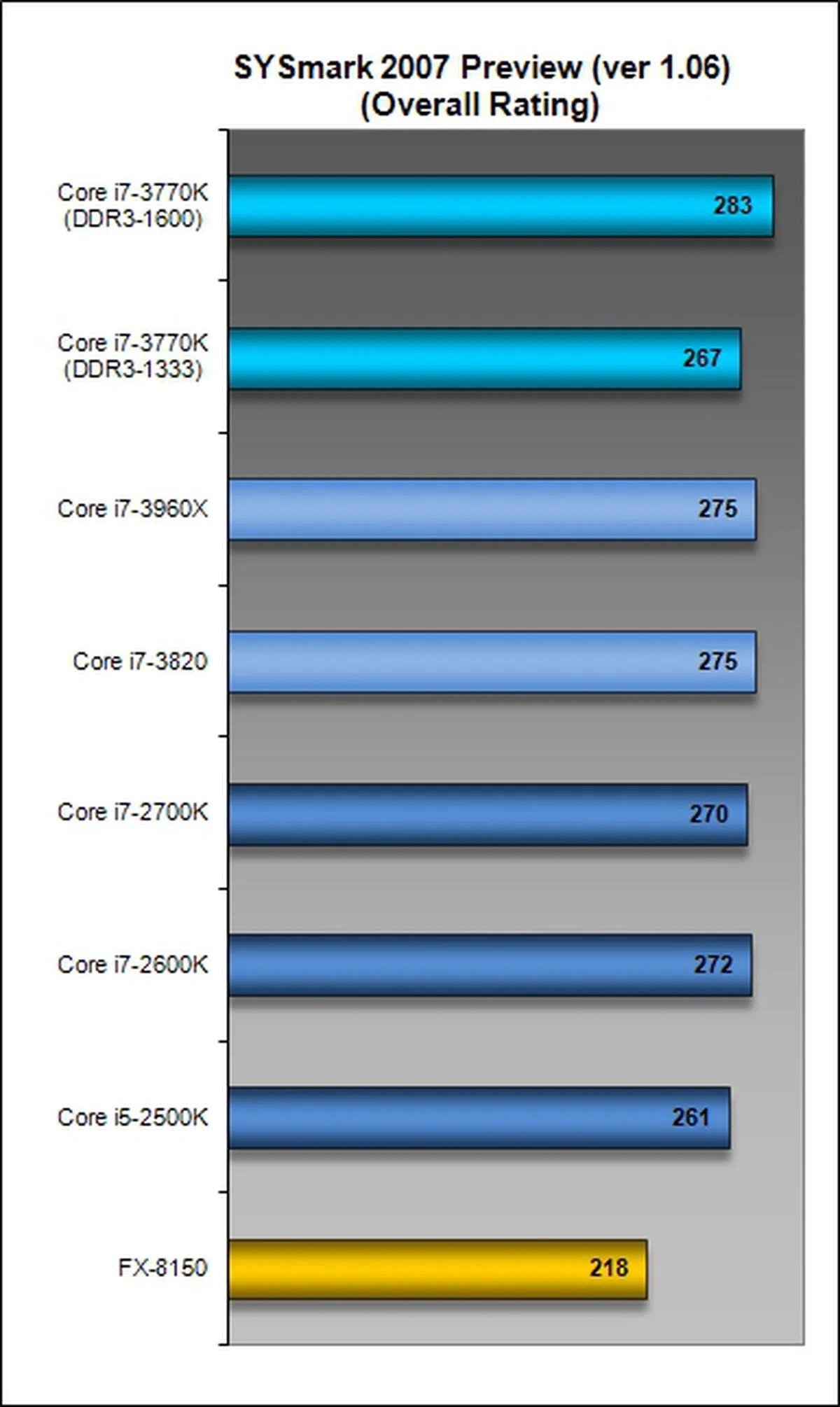 | 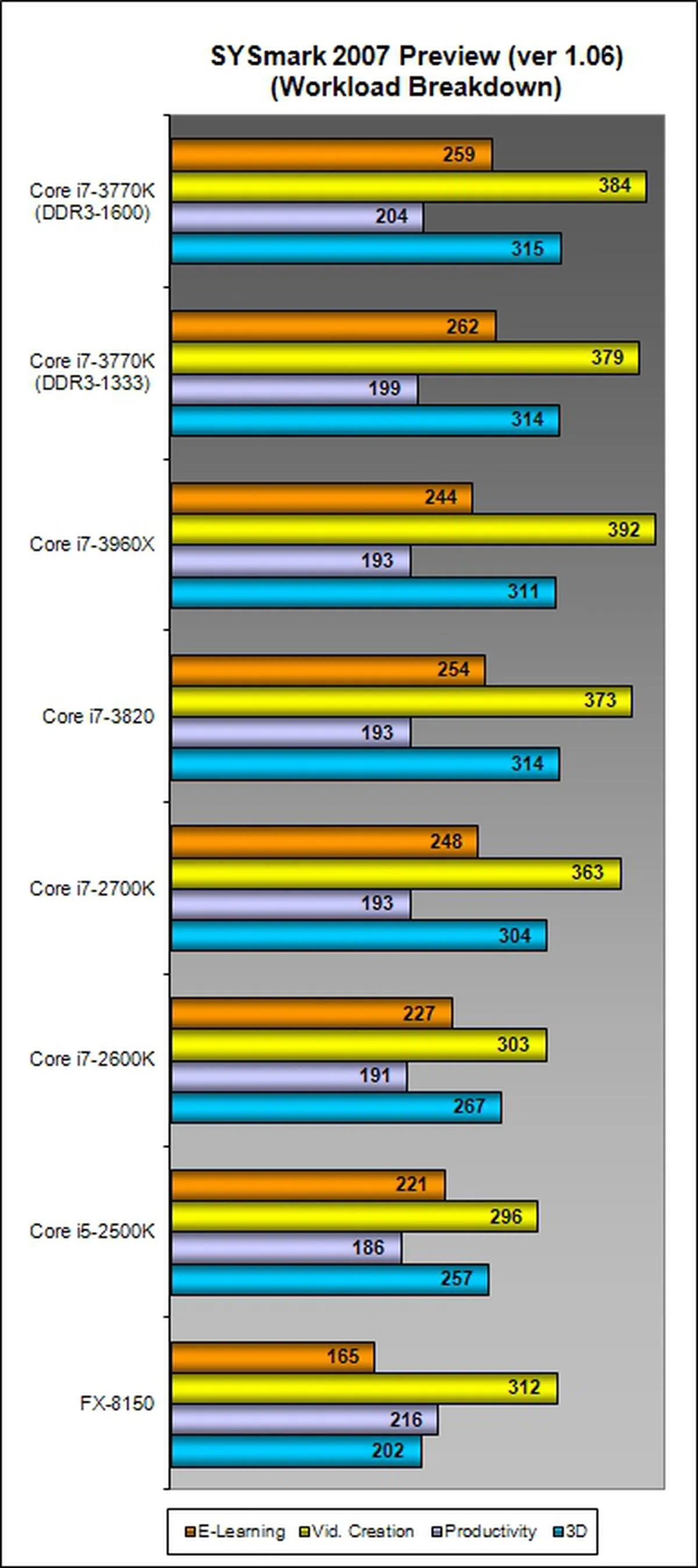 |
Results - Lightwave 3D 9.0
With the results from Lightwave 3D 9.0 (64-bit), the Intel i7-3770K took pole position in all test situations. The different clock frequencies of the CPU's memory modules didn't affect its scores significantly. The raw CPU power of the Sandy Bridge-E processors failed to upstage the Ivy Bridge processor even in highly threaded workloads from this program.
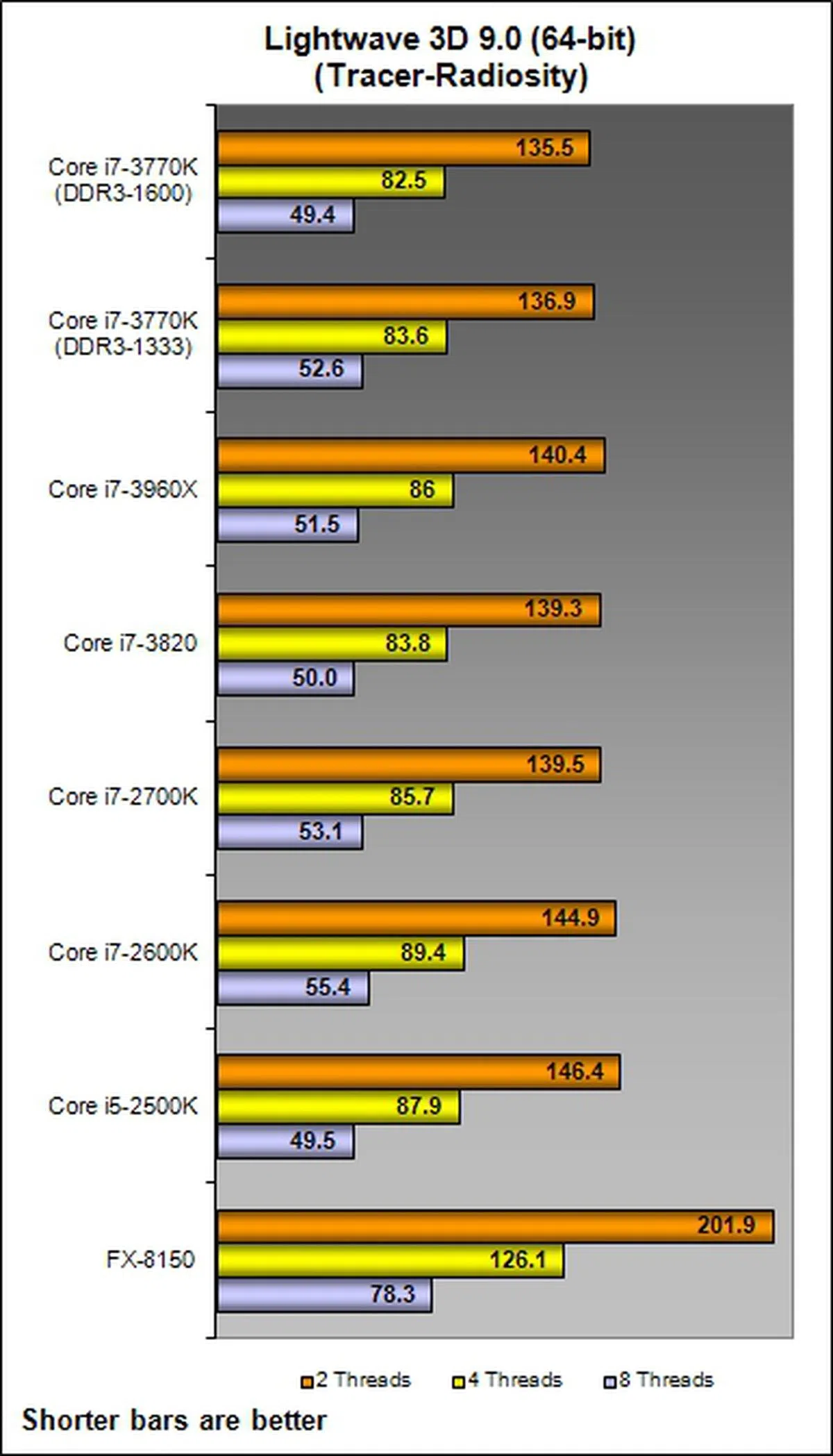 | 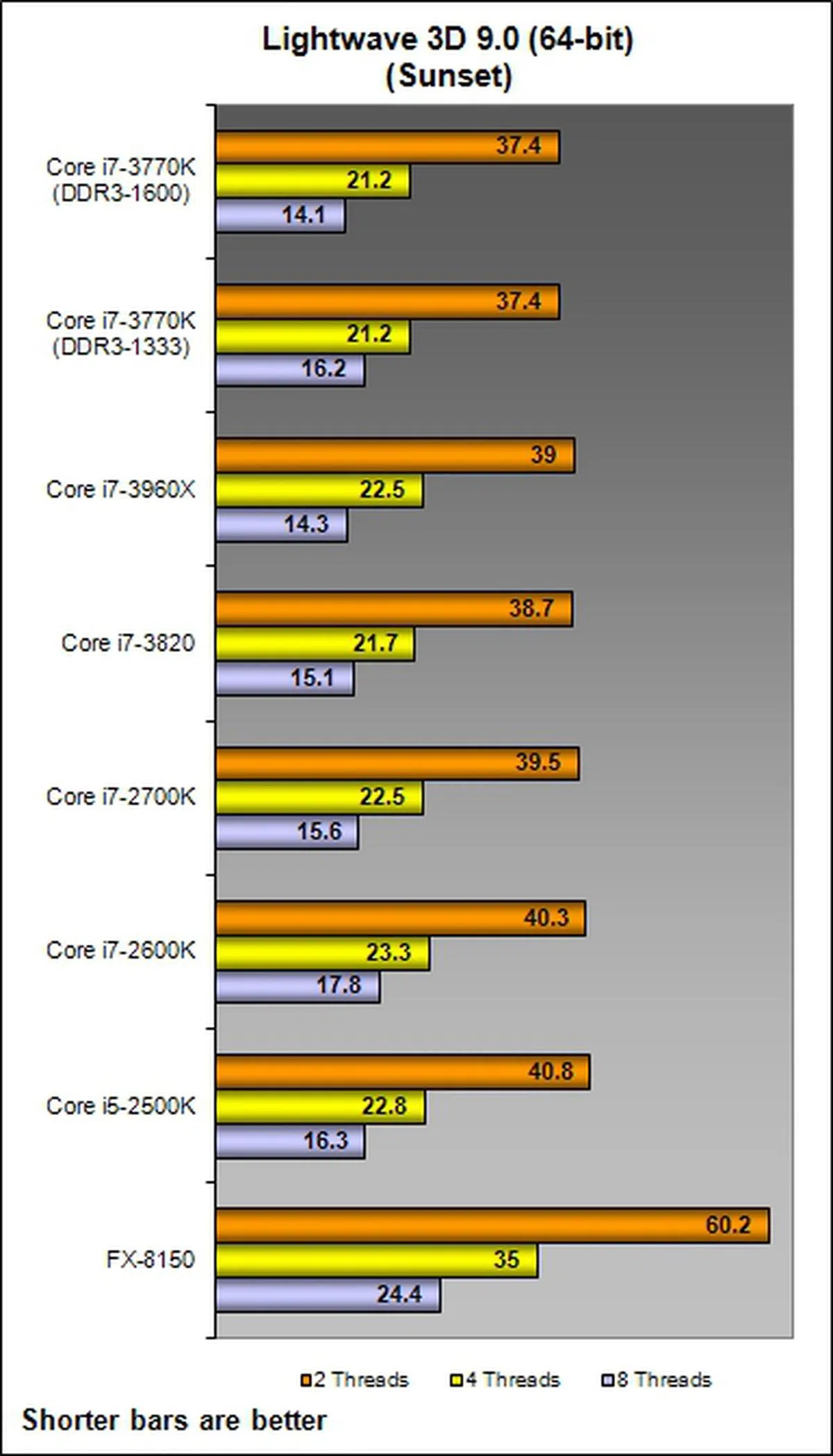 |
Results - Futuremark PCMark Vantage
With the exception of AMD FX-8150, the Intel CPUs made short work of the diverse range of tests of PCMark Vantage as they were seen running neck-to-neck in their performance scores. Only upon closer scrutiny can we ascertain the winning form of Intel I7-3770K. Even running the memory modules at 1333MHz (below its official 1600MHz supported memory clock speed) failed to slow the Ivy Bridge CPU in the face of competition from the Sandy Bridge processors. The neck-to-neck race amongst the Intel CPUs is due to the fact that PCMark Vantage has more productivity tasks than multimedia content creation workloads, as such all their scores seemed to be leveling off above the 12,000 mark (Overall Score). In any case, the newcomer is the fastest of the lot.

 | 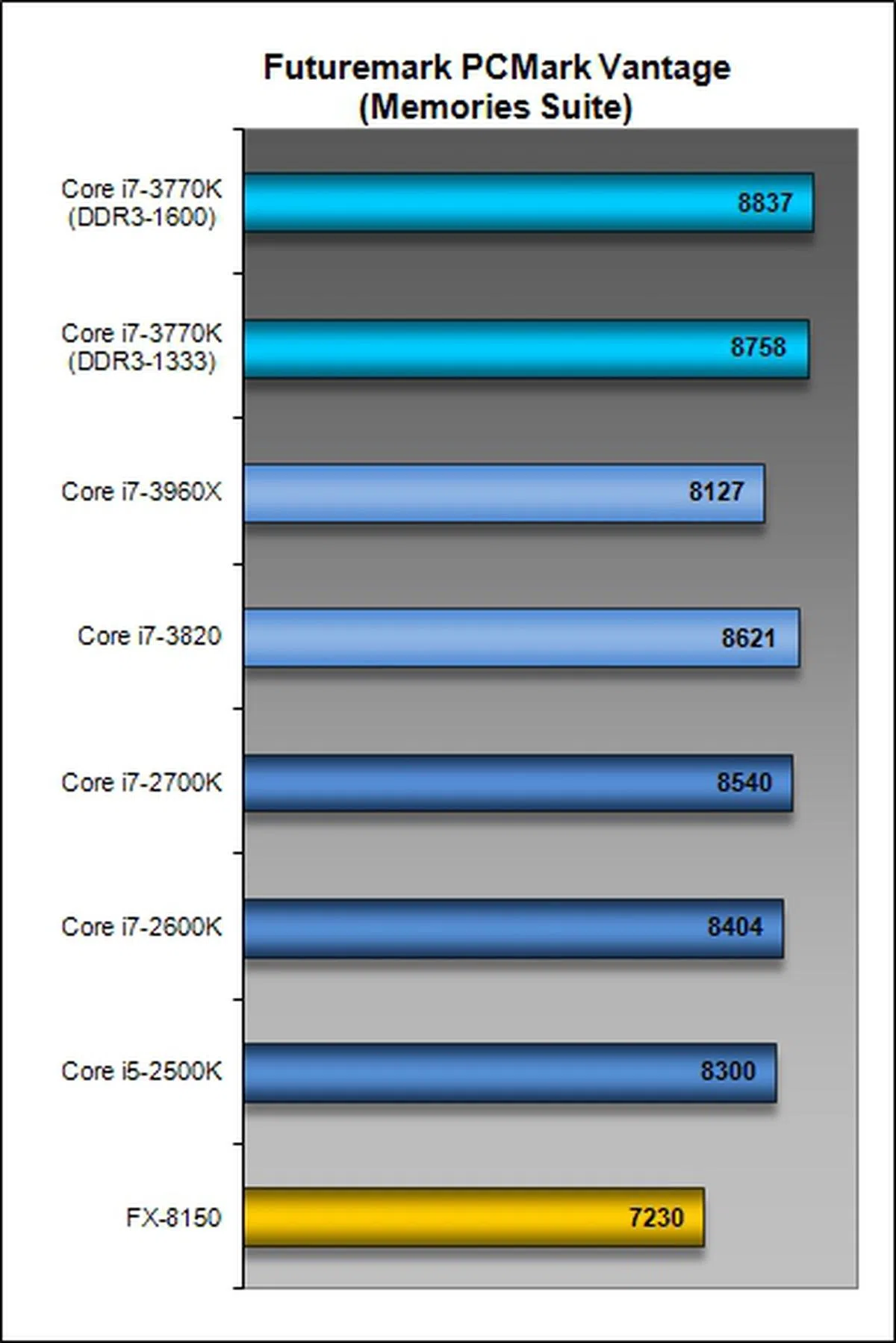 |
Results - Futuremark PCMark 7
The Futuremark PCMark 7 software is designed specifically for Windows 7 and measures the performance of the hardware system across a series of different scenarios. From the overall scores, the Intel Core i7-3770K (with the memory modules clocked at their rated 1600MHz clock speed) takes the lead with a razor-thin margin of less than 1% over the Intel Core i7-3960X. We have not put all our second generation Sandy Bridge CPUs through the paces of PCMark 7 yet; however, we shall do so in the near future as we progressively update their performance scores. In the meantime, the sole representative from that generation is our Intel i7-2700K that is about 5.5% behind the Ivy Bridge CPU.
Looking at the Computation scores, the strengths of the improved architecture of Ivy Bridge are shown as the Intel i7-3770K is just lagging behind the i7-3960X processor by slightly over 5%. In another CPU-specific test (Lighweight test), the former was just 0.9% behind the i7-3960X.


Results - Cinebench 11.5 & Handbrake 0.9.4
The Cinebench 11.5 is a well-threaded piece of software and this test is able to leverage on any extra processor cores, courtesy of Intel's HyperThreading technology. The Ivy Bridge CPU outperformed the Sandy Bridge processors by margins in the range of 8%. This winning performance underscores the superiority of the new architecture of the Ivy Bridge CPU and was almost on-par with the Sandy Bridge-E based i7-3820! Only the hex-core monster Core i7-3960X was able to pull ahead of the comparisons by a notable degree.
For the video encoding test administered by Handbrake 0.9.4, the Core i7-3960X pulled in first while Intel i7-3770K is a distant second with a loss margin of 25%. Its performance profile in this test is similar to that of Cinebench, besting the Sandy Bridge CPUs by similar winning margin range (of about 7%) and running neck-to-neck with the Core i7-3820.


Results - 3ds Max 8 (SP2)
The Light Tracer is a less-taxing renderer and Intel i7-3770K processor only managed to pull ahead of the Sandy Bridge CPUs by a margin of under 10%. It lost to Intel Core i7-3820 by just over 4.6%. The difference among the Sandy Bridge-E based CPUs and the Intel I7-3770K processor was just a few percentage points (less than 1% to slightly over 3%) when using the more strenuous Radiosity renderer, underscoring the strengths of the new Ivy Bridge processor under load.
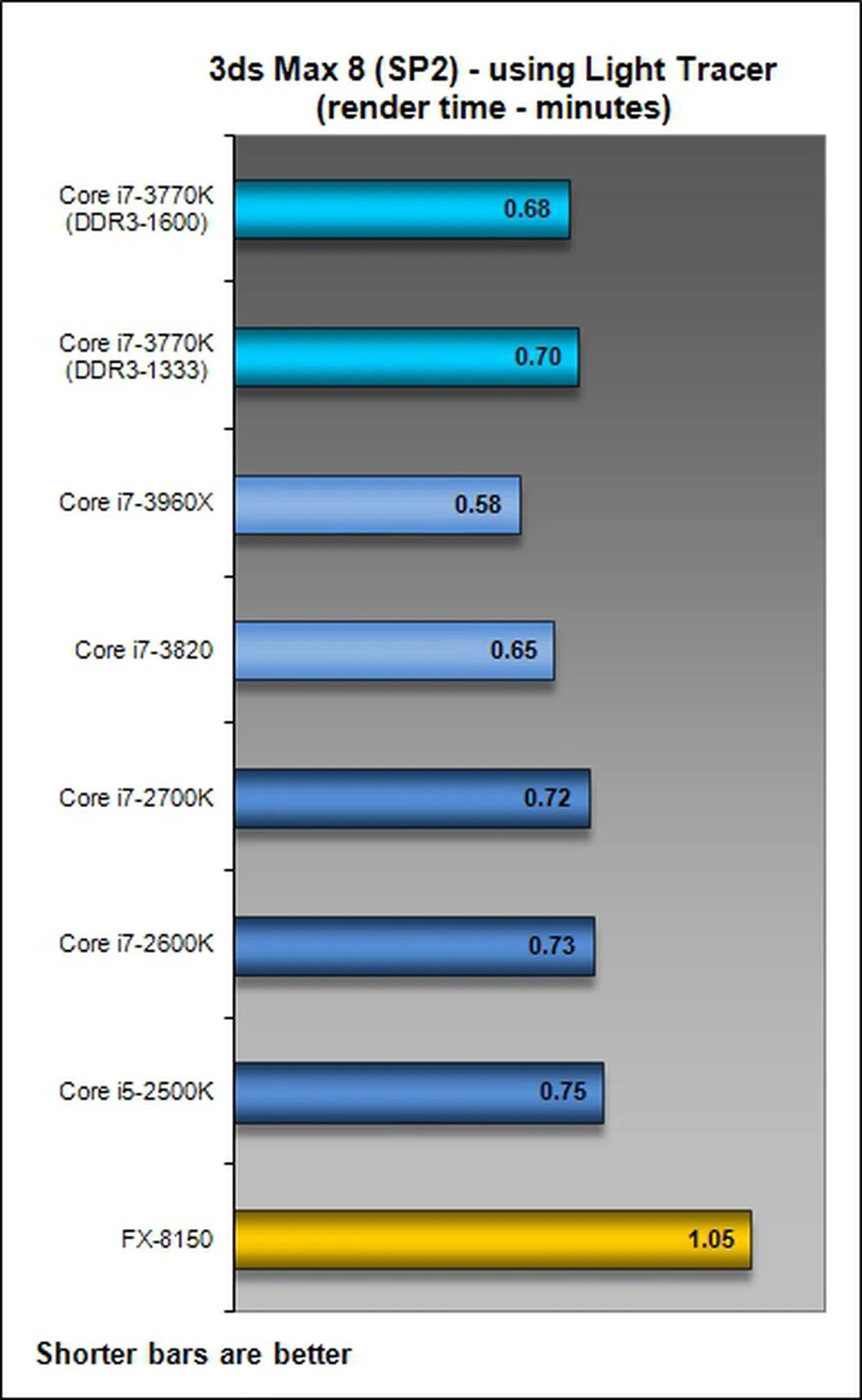 | 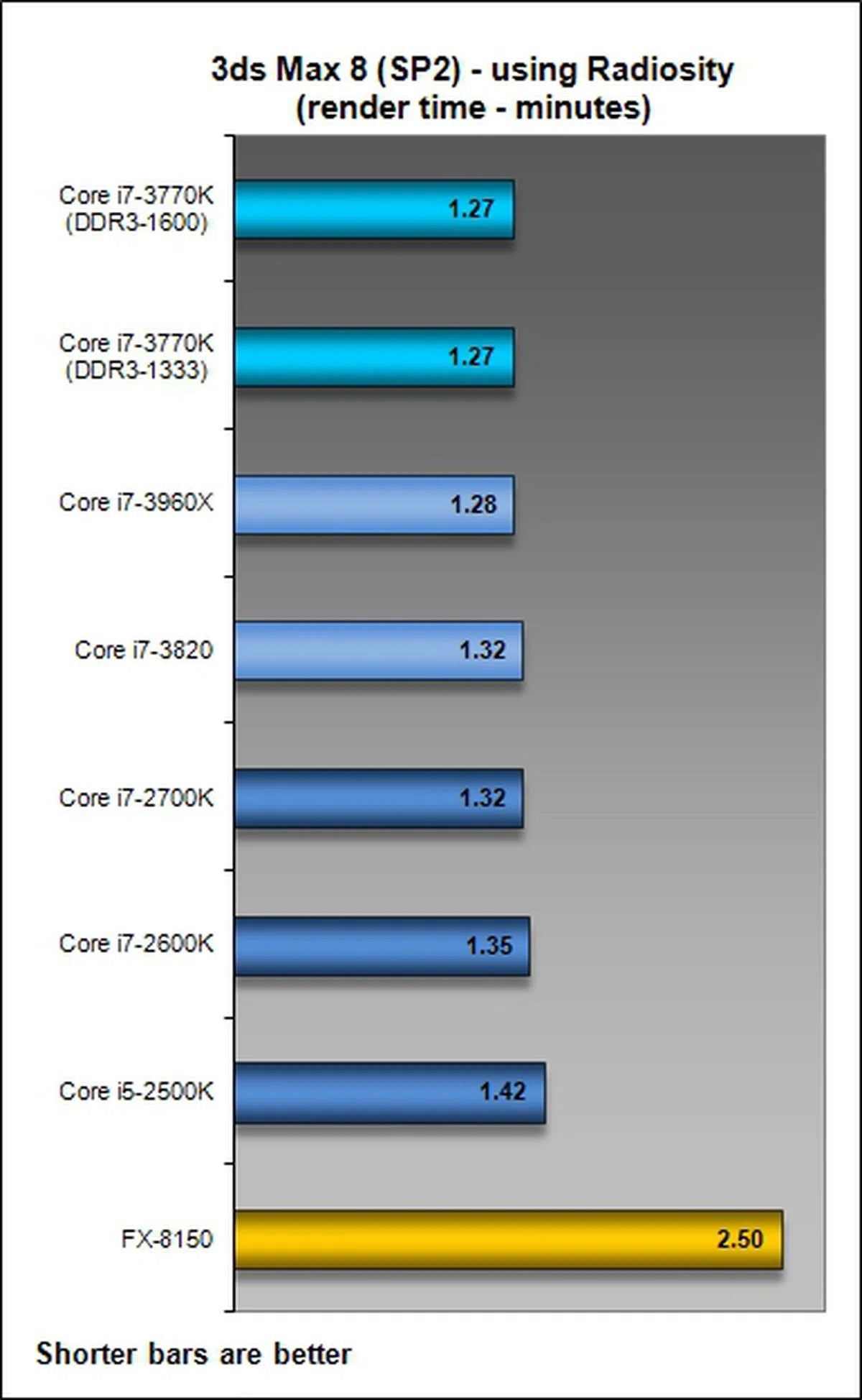 |
Results - Futuremark 3DMark Vantage
The Overall Score of this benchmark doesn't reveal much about the capabilities of the CPUs, with their scores almosting flat-lining - further affirming that this is a purely graphics card heavy benchmark. The CPU scores reveal the strengths and weaknesses of the Ivy Bridge processor. It pulled ahead of the Sandy Bridge-based chips, beating the more powerful Intel i7-2700K by a margin of almost 4%. It trailed behind the Sandy Bridge-E camp, behind the Intel i7-3820 by a just 1.81%. (We are using the score when the memory module were ran at their rated clock frequency of 1600MHz; the 'slower' memory clock run was accompanied with tighter memory timings which triggered better overall CPU performance in this test).
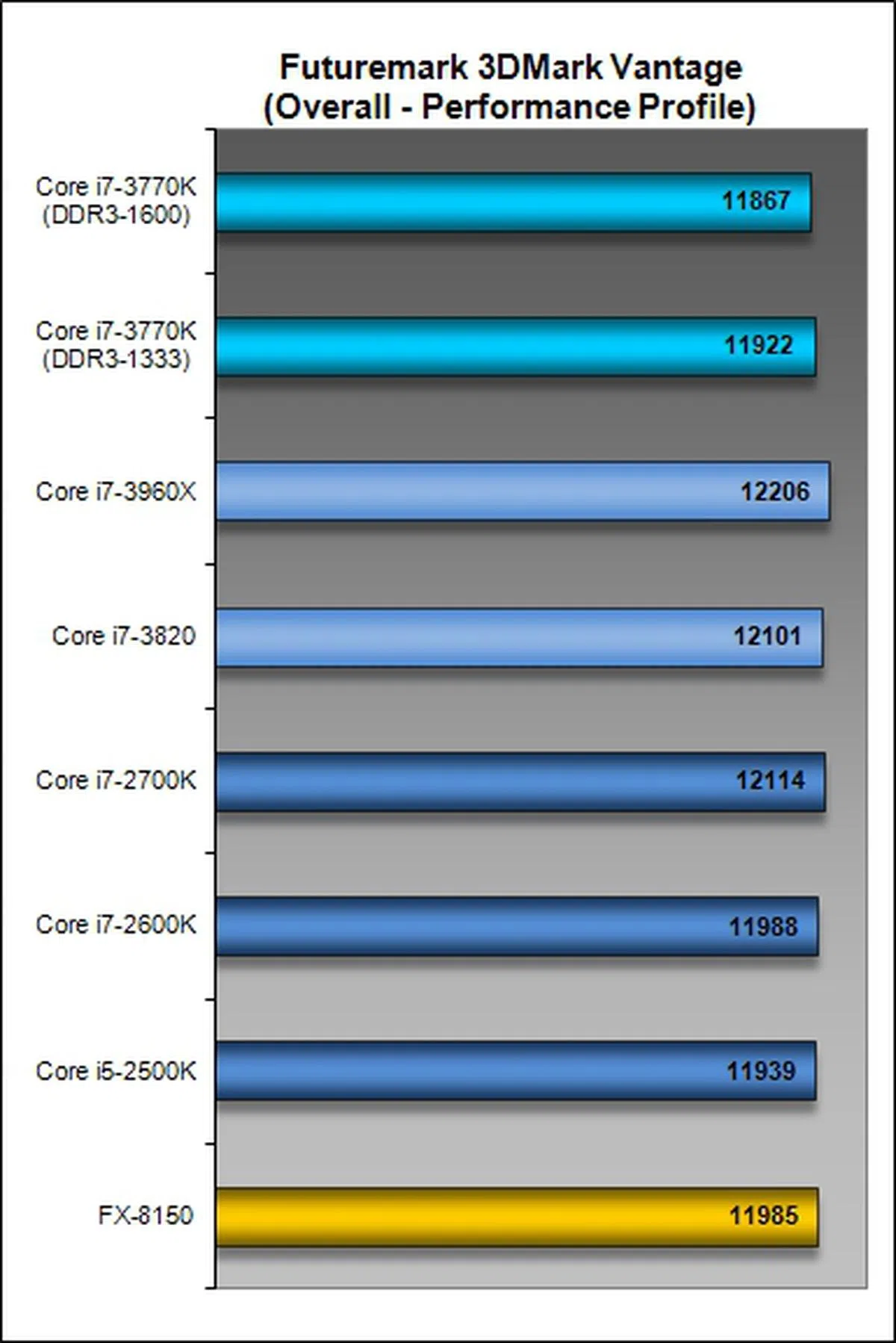 | 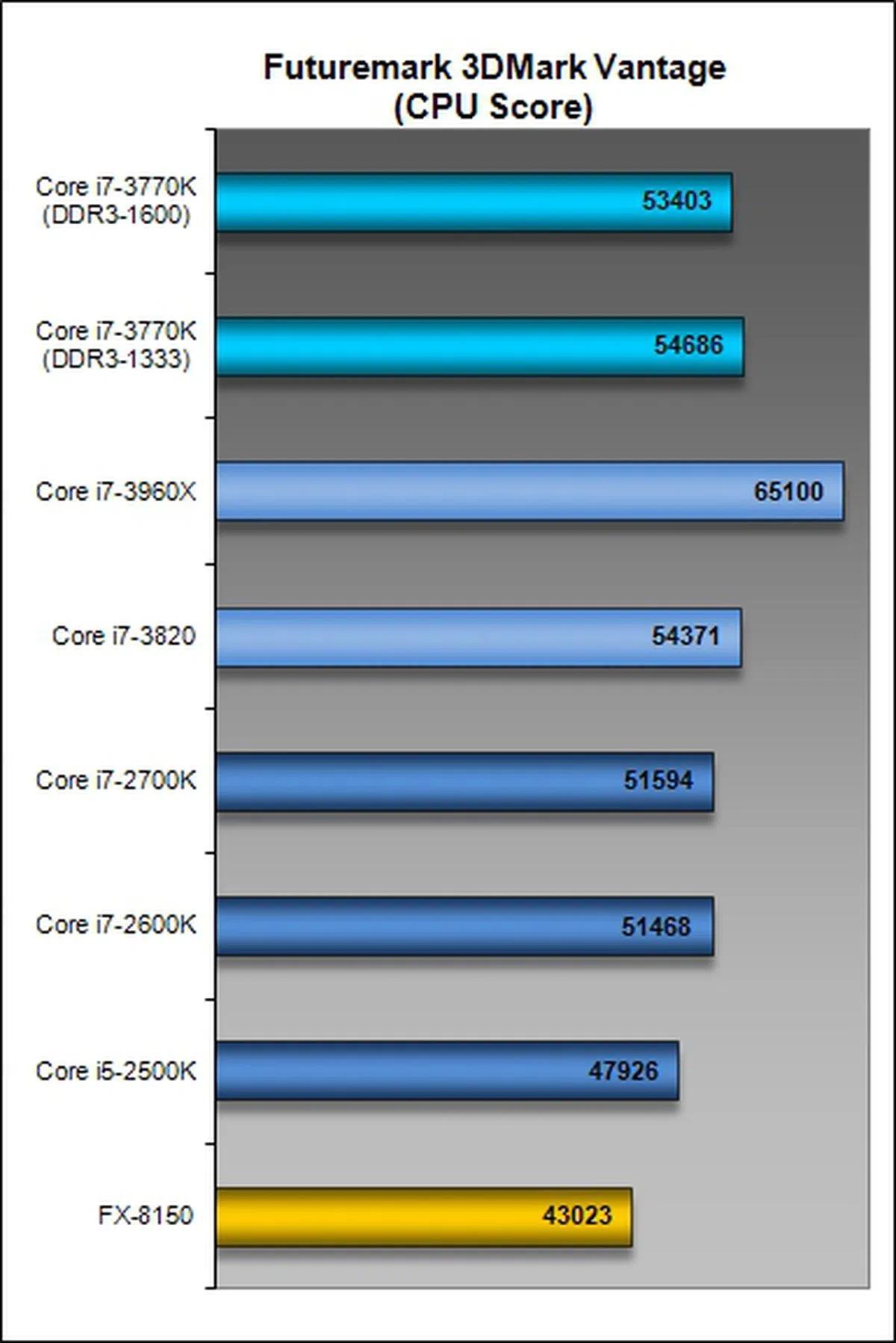 |
Results - Far Cry 2 & Battlefield Bad Company 2
For these games, the resolution and game settings are not too taxing for our graphics card so that we can ascertain if there are any performance benefits with higher-end processors. The scores for Far Cry 2 point to mainstream processors as the winners with the Sandy Bridge-E CPUs lagging slightly behind. In the Battlefield benchmark, the CPUs were churning out the similar scores.


Power Consumption
While idling, the Ivy Bridge processor's all-new Tri-gate (3D) transistors technology that promised to lower power consumption by up to 50%, ensured it sipped the least power. With heavier workloads such as the 3DMark Vantage CPU test, we did see its power efficiency at work, with its power rating about 50W lower than the Intel i7-2600K with its older platform. While it didn't deliver the promised 50% power saving, we were still fairly impressed by its power efficiency as it managed up to 20% lower measured power draw. Interestingly, the DDR3-1600MHz run incurred less power usage than at DDR3-1333MHz. The compared Core i7-2700K was using a platform similar to the Core i7-3770K and that caused its power ratings to differ from the expected profile of the older Sandy Bridge processors compared. Yet another interesting point was the Core i7-3820's low power consumption which rivaled Ivy Bridge.
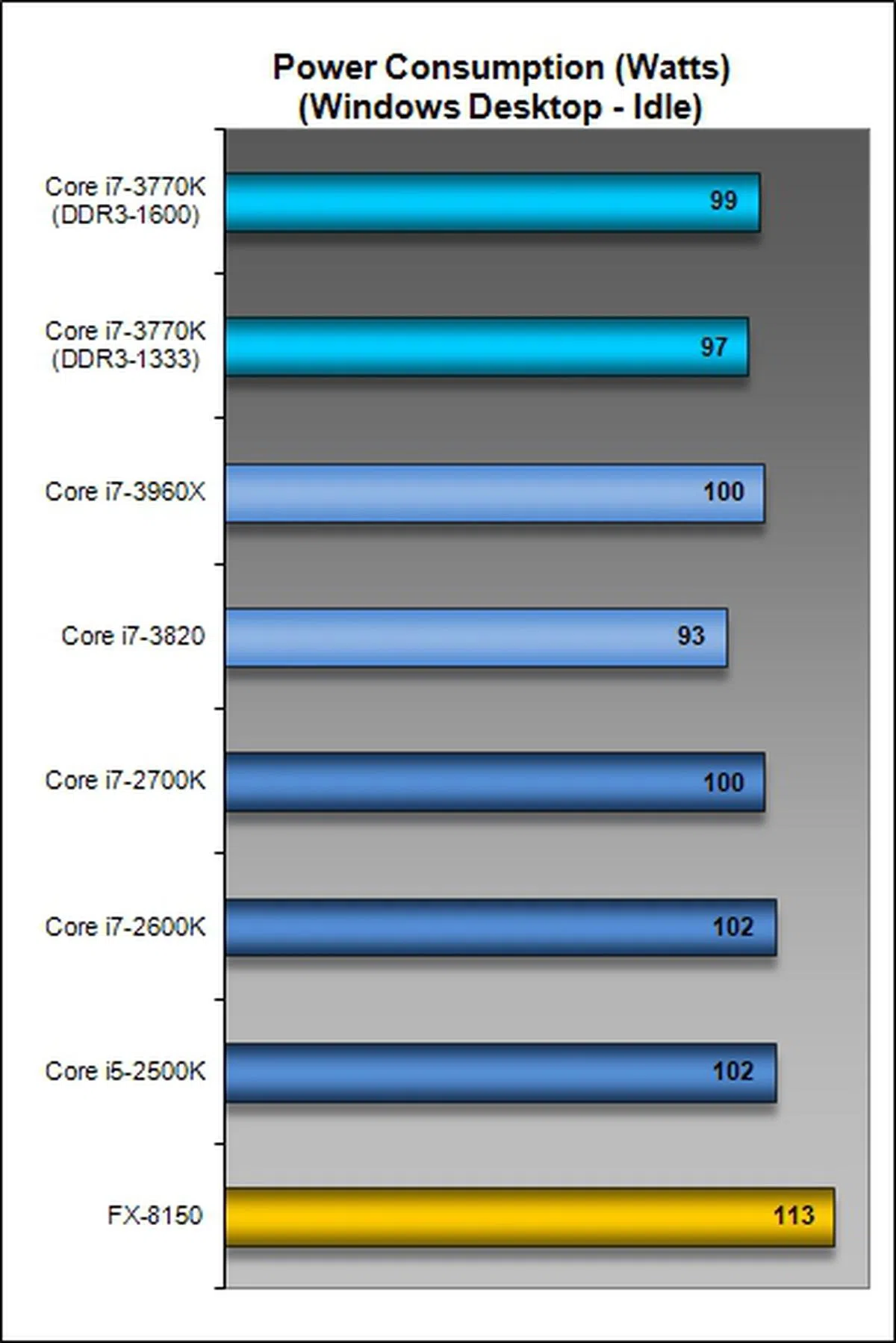 | 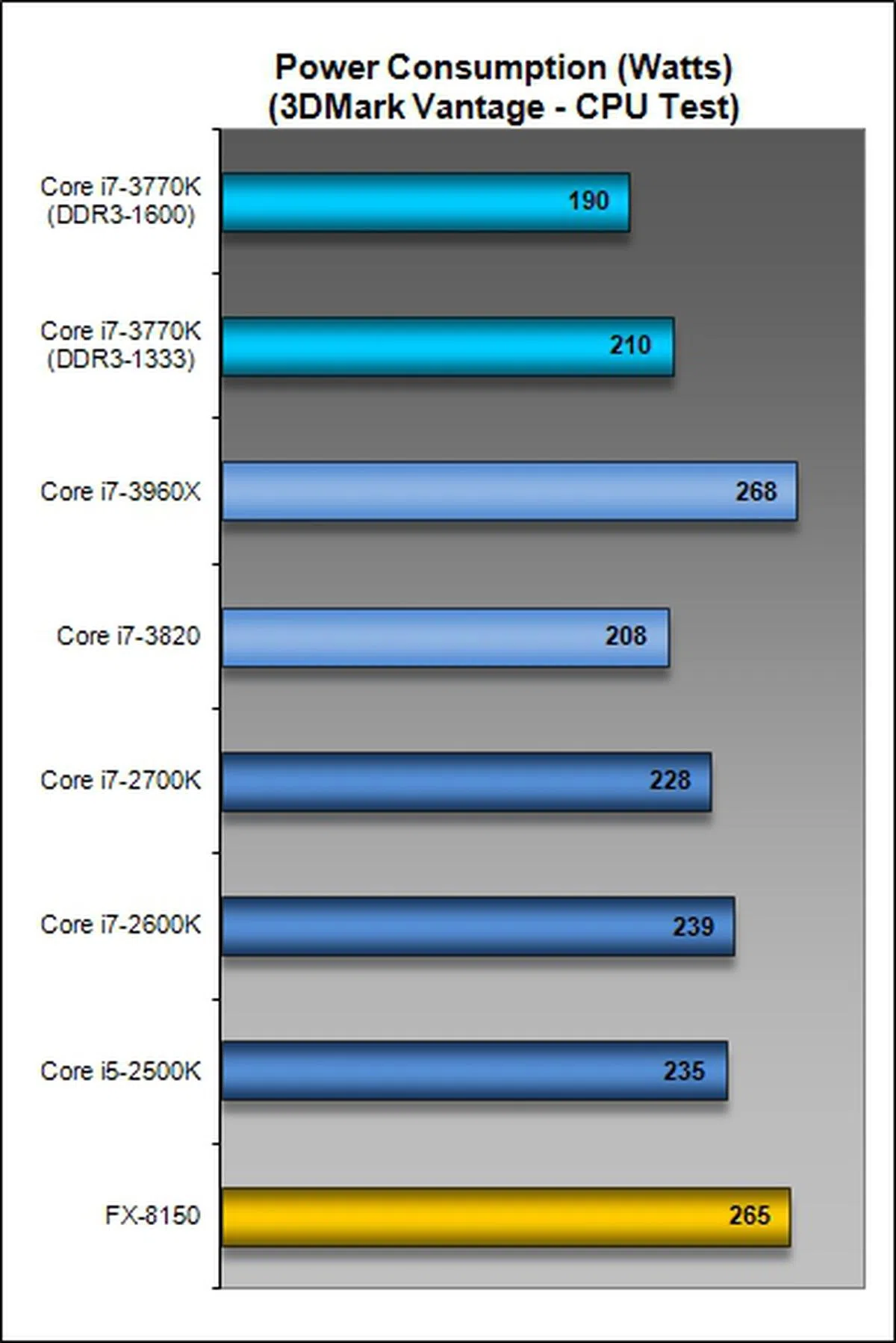 |
For SPECviewperf 10 when setting the workload for four threads, the Intel i7-3770K processor performed the best with lowest sustained peak power rating of only 185W - better than Sandy Bridge and Sandy Bridge E processors by a notable margin. Power savings of the new platform vs. the older platform was close to 30%!

Overclocking
We managed to push the Ivy Bridge (with stock air cooling) to 4.8HGz by setting all its CPU Core Ratios to 48. We also needed to set the voltage offset to +300mV and push both its Burst and Sustained Modes to the same setting of 500 (as recommended by Intel). At air cooling with it paltry stock cooler, this is the most stable overclock we achieved and it's quite a feat by itself.
For Cinebench 11.5, this overclock translated to a gain of slightly over 12.3%. For its CPU Score of the 3DMark Vantage benchmark, the improvement was less than 10% (only a paltry 8.8% to be exact). It seems that we would need to go back to the drawing board in order to garner more impressive performance gains from the Ivy Bridge processor. We have to look at better rated OC memory modules and investing in a customized CPU cooler. For the Far Cry 2 scores, overclocking the processor didn't increase the performance much.
What about overclockability in comparison to Sandy Bridge processors? As shown in our past review of the Core i7-2600K overclocking performance, it managed slightly lower overclocks - about a maximum of 4.6GHz. However, its results in the first two benchmarks are actually up to 6% better than a higher clocked Ivy Bridge processor. This suggests what some have been discussing in the online space that Ivy Bridge actually operates hotter than Sandy Bridge in overclocked states and it's probably hitting the thermal limits of the processor, which gives rise to less than stellar performance increases. We'll be providing more details on this after more thorough testing with repeatable findings.

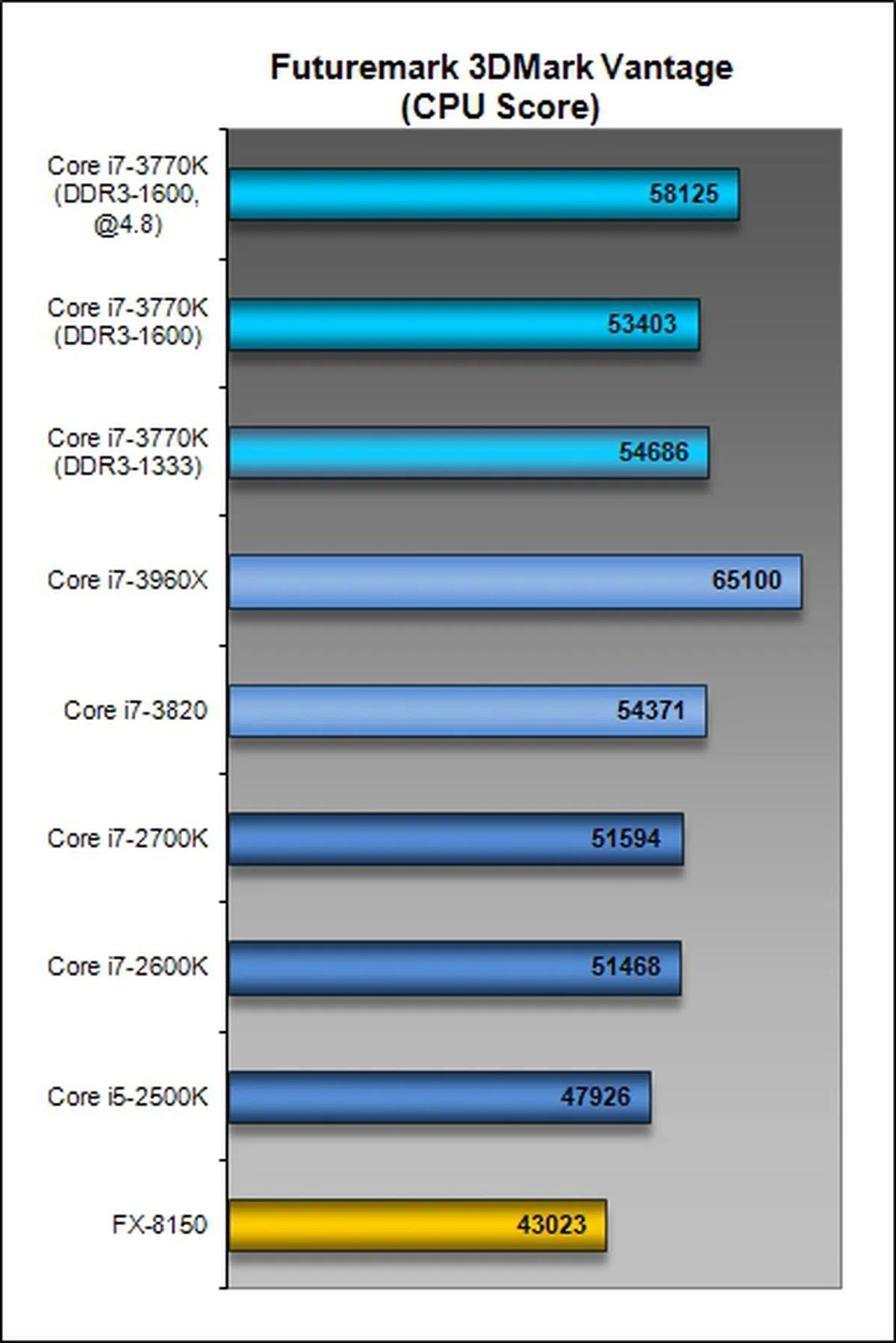 | 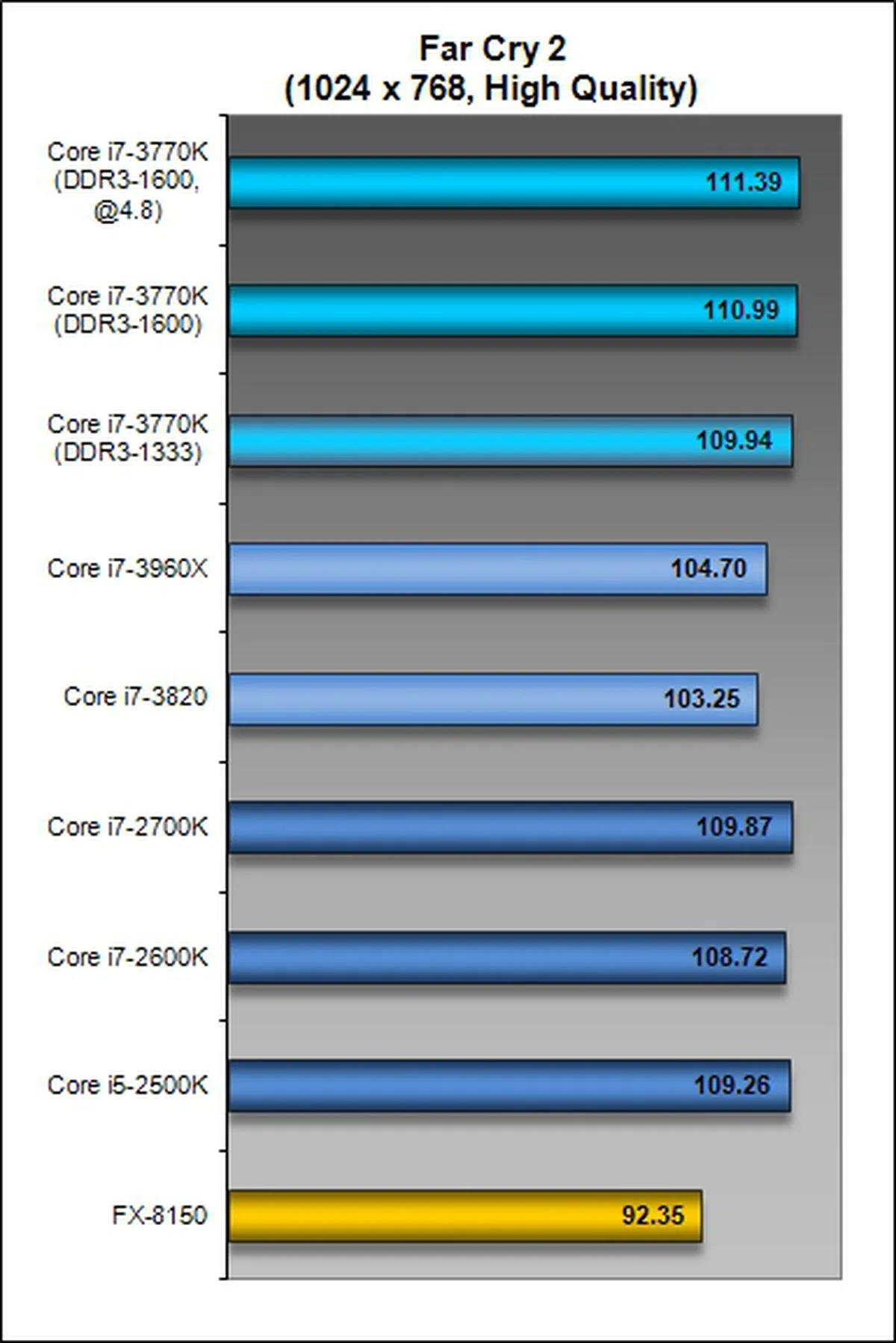 |
** Updated on 25th April - Conclusion updated with renewed findings and comparisons.
Conclusion - Doing More with Less
With its improved new CPU architecture, the general performance of the Intel i7-3770K CPU prompts us to label it as a one that is skewed for multi-threaded applications. It will appeal to power users and enthusiasts who demand workstation-like performance and power optimization balance. It is a fine line to walk and we do strongly feel that the Intel Core i7-3770K does so with finesse. It understandably outperformed the Sandy Bridge-based CPUs with consistent margins (though usually less than 10%) and on certain tests, it even managed to rival or beat the server-grade Intel i7-3960X processor in terms of raw computing power. Of course, given our consumer-oriented benchmarks, we're not surprised that the Sandy Bridge-E processors didn't really shine against the new mainstream chip in town.
Its improved integrated GPU of the Intel i7-3770K, featuring the more powerful new HD 4000 GPU will appeal to users who will leverage on the LucidLogix Virtu MVP software with its familiar Virtu GPU-tasking capabilities that is touted to dynamically assign tasks to either the integrate GPU or the discrete GPU. This version has added two 3D features: Virtual Vsync to reduce screen tearing and HyperFormance to increase frame rates. The choice of using either graphical processing option will make the Ivy Bridge processor appealing to a broader market, but so has the old Sandy Bridge ever since it acquired the Z68 chipset platform (as such it's probably not much of an advantage for Ivy Bridge). Another enhancement is its native support for up to three simultaneous displays. More analysis of its integrated graphics performance is available in a separate article, but in short, though it's better than its predecessor, it still leaves you wanting more as the competition's APUs can deliver a lot more.
Overall, we feel that with features appealing to a broad spectrum of general users, Intel is astutely building on its reputation as a market leader in desktop computing. As its fleshes out the Ivy Bridge lineage with its lower desktop SKUs as well as mobile versions of the Ivy Bridge, the competition has serious reasons to be concerned about. As such, the upcoming AMD Trinity APUs could prove to be an interesting competitor in some aspects.
From a price-performance perspective, we can safely say that the new Intel Core i7-3770K will be offered at a similar price point of the existing Core i7-2700K at just over US$300. This means you'll be getting the latest for the same price, which offers better features and a slight performance improvement. Furthermore, when compared to the Intel Core i7-3820, this older processor might have a price advantage at the CPU level (sub US$300), but not at the platform level when considering the expensive Intel X79 motherboards. Even in terms of performance, the Core i7-3820 and the Core i7-3770K are fairly equally matched. As far as mainstream enthusiasts are concerned, the top Ivy Bridge processor has what it takes to appeal to even more users than is predecessor. And we haven't even iterated upon its power efficiency angle.
Given what we've seen from the Core i7-3770K, Ivy Bridge looks set to be the platform of choice for most folks for the rest of the year (not that they've much choice) as more variations of it will follow suit for desktop and mobile systems. It's not exactly breathtaking, but its improvements all round certainly contribute to its appeal.
The problem however is that Ivy Bridge processors won't really appeal to the core enthusiast DIY market who would probably be using some form of a Sandy Bridge class processor already. This is because clock for clock, the tangible improvements are small. You would think that the 22nm fabrication would allow it to stretch itself further, but overclocking seems limited as high speeds quickly develop hot spots which hinder the processor's overall performance as we've noticed. We don't mean Ivy Bridge is bad, but ironically it just won't appeal much to the same group of people it was meant to appeal because it's compatible with most Sandy Bridge equipped systems. Instead, the new processor and platform will be ideal for those who've not yet made the jump to Sandy Bridge based systems or those who've very low-cost Sandy Bridge processor based systems and want to upgrade it with a top of the line Ivy Bridge processor.
Like we mentioned earlier, Ivy Bridge is a nice update, but it's not a stellar one.
Our articles may contain affiliate links. If you buy through these links, we may earn a small commission.